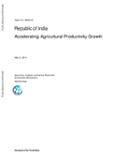Republic of India : Accelerating Agricultural Productivity Growth
In the past 50 years, Indian agriculture has undergone a major transformation, from dependence on food aid to becoming a consistent net food exporter. The gradual reforms in the agricultural sector (following the broader macro-reforms of the early 1990s) spurred some unprecedented innovations and changes in the food sector driven by private investment. These impressive achievements must now be viewed in light of the policy and investment imperatives that lie ahead.


